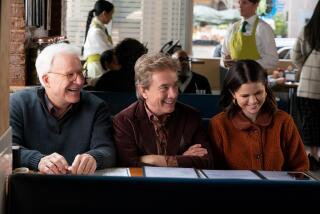‘American Crime’ mastermind John Ridley wants viewers to face ‘what’s going on in their own backyard’
What to do for an encore after the ABC limited series “American Crime” picked up 10 Emmy nominations for its first season encompassing murder, drug addiction and Islamophobia? Show creator John Ridley and producer Michael McDonald decided to focus on high school sexual assault in small-town Indiana. And to up the stakes, at the last minute they added a twist guaranteed to push viewers out of their comfort zone.
Ridley recalls, “On the Sunday night before our Tuesday pitch meeting with the network, we asked ourselves, ‘Is there another element that would be really provocative?’”
The answer came in the form of an inciting incident involving “male peer-to-peer sexual assault” after which a 15-year-old boy accuses a basketball player of raping him. Ridley explains, “We wanted to tell a story where people go, ‘Wait a minute, are you making this up, did this really happen?’ We wanted to force people to question their assumptions and look at what’s going on in their own backyard.”
It’s not only about sexual assault. It’s also about schools, it’s about social media and economics and race and class and homophobia.
— John Ridley
The season kicks off when images go viral showing a drugged 15-year-old Taylor Blaine (Connor Jessup) half-dressed and passed out at a wild party organized by basketball players from the exclusive Leyland Academy. The scandal plays out to ruinous effect as Taylor’s bewildered mother Anne (Lili Taylor), basketball coach Dan Sullivan (Timothy Hutton), a star player’s protective mother, Terri LaCroix (Regina King), private school director Leslie Graham (Felicity Huffman) and gay basketball player Eric Tanner (Joey Pollari), the alleged assailant, get entangled in the he said/he said controversy.
Although the 10-episode story arc is fictional, Ridley researched actual assaults to inform the narrative. “There were any number of real incidents that we looked at,” Ridley says. “In Steubenville, Ohio, young men were accused of assaulting a young girl so we certainly drew from that.” And as the show ramped up for production in Indiana, the truth-is-just-as-disturbing-as-fiction premise materialized in real life just a few miles away. Ridley recalls, “In Carmel, Ind., up the street from where we were shooting, an incredibly similar incident happened involving a basketball team and players of color where a 14-year-old high school student alleged he was abused by older basketball players in the locker room at school.”
We wanted to look at the cascading effect this crime has on an entire community.
— John Ridley
Ridley, an Oscar winner for his “12 Years a Slave” screenplay, says that “when you’re dealing with real-life stories you need to honor the facts, but certain incidents take on a cultural density beyond the horror of the crime itself. For ‘American Crime’ we needed the latitude to take the story into all these different directions because it’s not only about sexual assault. It’s also about schools, it’s about social media and economics and race and class and homophobia. We wanted to look at the cascading effect this crime has on an entire community.”
“American Crime” Season 2 chronicled family collapse, hate crimes, drug arrests, hacking, public shaming, multiple firings and murder in a succession of cliffhangers up to and including the finale. By design, Ridley and his team left the fate of its central characters up in the air. “There’s a clarity to our storytelling but there are also moments where we want to baffle the audience,” Ridley says. “I’m very aware that our show doesn’t go down easily and if you come away from our show nodding in agreement, then we’ve made a mistake. If you come away from ‘American Crime’ with your head askew going, ‘Uh, what?’ then we’ve done our job.”
The open-ended story arc served as a final provocation to viewers invested in the troubled teenagers at the heart of the tragedy. “My wife said to me, ‘I so wanted a happy ending for these boys.’ And I told her, ‘If that’s what you want, then you got it,’” Ridley says. “For me, this show is like when you work on a puzzle and you’re almost done and you say, ‘Where’s that last piece?’ Rather than telling the audience ‘Here’s your puzzle, we’ve done it for you,’ we wanted to present most of the puzzle and then say to people ‘You’ve got to find that last piece yourself.’”
MORE:
When an intense role haunts you, leave your wig behind, says Lili Taylor
Felicity Huffman found her ‘American Crime’ character through research — and Spanx
Lili Taylor’s advice to ‘American Crime’ costar Connor Jessup: ‘Do it all, all the time’
calendar@latimes.com
More to Read
From the Oscars to the Emmys.
Get the Envelope newsletter for exclusive awards season coverage, behind-the-scenes stories from the Envelope podcast and columnist Glenn Whipp’s must-read analysis.
You may occasionally receive promotional content from the Los Angeles Times.




